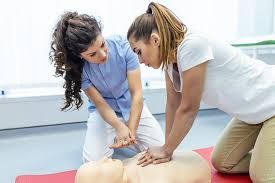Emergencies can happen anywhere, at any time, and to anyone. Whether at home, work, or in public places, medical situations such as choking, cardiac arrest, burns, and fractures require immediate attention. First aid training prepares individuals to respond quickly and effectively, reducing the risk of complications before medical professionals arrive. Knowing how to provide basic first aid can save lives, prevent minor injuries from becoming severe, and offer comfort to those in distress.
First aid training is not just for healthcare providers—it benefits parents, teachers, employees, and everyday people. The ability to remain calm and take appropriate action in an emergency fosters confidence and preparedness. We will explore why first aid training is essential for everyone, how it enhances safety, and its impact on individuals and communities. Learning basic medical response skills ensures that people are ready to assist when help is most needed.
Significance of first aid training
- Saving Lives Through Immediate Action
First aid training is important because it equips individuals with the knowledge to save lives. Many medical emergencies require immediate attention, and the time it takes for an ambulance to arrive can be critical. Knowing how to perform CPR, control severe bleeding, or assist a choking victim can mean the difference between life and death.
A person suffering from cardiac arrest, for example, may not survive if CPR is not administered within the first few minutes. Oxygen deprivation to the brain can cause permanent damage in a short period, making immediate chest compressions crucial. Similarly, in cases of choking, applying the Heimlich maneuver can clear the airway before the situation becomes fatal. First aid training provides step-by-step instructions on handling these situations, ensuring individuals can act without hesitation. The ability to provide care before emergency services arrive increases survival rates and reduces the severity of injuries.
- Preventing Minor Injuries from Becoming Severe
Not all medical situations are life-threatening, but minor injuries can worsen severe conditions without proper care. A simple cut can become infected if not cleaned and dressed correctly, and a minor burn may worsen if not treated promptly with cool running water. First aid training teaches individuals how to handle everyday injuries properly, preventing further complications.
Knowing how to assess a wound, apply a bandage, and recognize signs of infection allows people to manage injuries effectively. When someone sprains an ankle or suffers a minor fracture, proper first aid techniques—such as immobilization—can reduce pain and prevent further damage. First aid training also includes handling heat exhaustion, dehydration, and allergic reactions, ensuring that individuals can care for various medical concerns. Knowing to respond appropriately to minor injuries prevents unnecessary emergency room visits and allows individuals to recover more quickly.
READ MORE : https://differencewise.com/
- Building Confidence and Reducing Panic in Emergencies
Emergencies can be overwhelming, especially for those who have never faced a medical crisis. When accidents happen, panic can delay response times and lead to ineffective decision-making. First aid training prepares individuals to stay calm, assess the situation, and act confidently.
Understanding how to respond to an injury or medical emergency reduces fear and hesitation, allowing people to assist effectively. Those who complete first aid training often feel more prepared in high-stress situations, knowing they have the necessary skills to help others. Earning a first aid certificate enhances confidence and credibility, ensuring individuals are equipped with the proper emergency management techniques. Whether at home, work, or in public settings, having the knowledge and certification to assist in medical situations fosters a sense of preparedness and responsibility.
- Creating Safer Homes, Workplaces, and Communities
First aid training contributes to safety by reducing risks in homes, workplaces, and public spaces. When more people are trained in first aid, there are more significant opportunities for immediate response in emergencies. Workplaces benefit when employees know how to handle accidents, reducing the severity of workplace injuries. Parents and caregivers with first aid training can respond quickly when children suffer minor injuries or medical conditions.
Communities also become safer when individuals are prepared to act in emergencies. Public events, schools, and recreational facilities all benefit from having trained individuals who can assist when medical situations arise. First aid knowledge fosters a sense of responsibility and encourages people to look out for one another. In natural disasters or large-scale emergencies, having individuals with first aid skills can help manage injuries before professional responders arrive. The presence of trained individuals in any setting ensures that assistance is available whenever it is needed.
First aid training is an essential skill that everyone should have, as it prepares individuals to respond to emergencies with confidence and care. Immediate action can save lives, prevent minor injuries from worsening, and reduce panic during high-stress situations. Knowing how to handle medical emergencies contributes to safer homes, workplaces, and communities, ensuring that help is available.
Preparing for medical emergencies is not just a valuable skill but a responsibility that can make a difference in someone’s life. Whether responding to a choking incident, performing CPR, or treating a wound, first aid training empowers individuals to take action when every second counts. Learning these essential skills creates a more prepared and compassionate society where people can rely on one another in need. By prioritizing first aid training, individuals can contribute to a safer and more responsive world for everyone.

